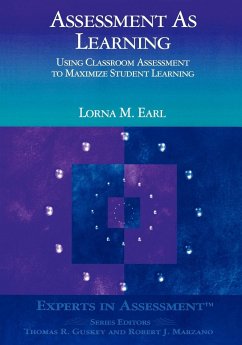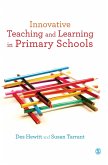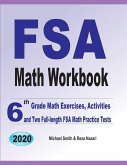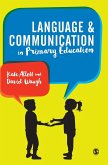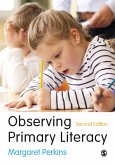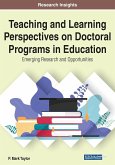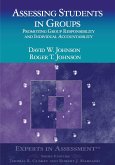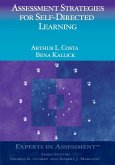- Broschiertes Buch
- Merkliste
- Auf die Merkliste
- Bewerten Bewerten
- Teilen
- Produkt teilen
- Produkterinnerung
- Produkterinnerung
This book will provide teachers and school administrators with: an understanding of the reasons behind their confusion and discomfort by detailing the way that the changing role of schooling and our increasing knowledge about the nature of learning have made classroom assessment much more complex, with a range of different purposes that require differentiated assessment practices.
Andere Kunden interessierten sich auch für
![Innovative Teaching and Learning in Primary Schools Innovative Teaching and Learning in Primary Schools]() Des HewittInnovative Teaching and Learning in Primary Schools136,99 €
Des HewittInnovative Teaching and Learning in Primary Schools136,99 €![FSA Math Workbook FSA Math Workbook]() Michael SmithFSA Math Workbook17,99 €
Michael SmithFSA Math Workbook17,99 €![Language and Communication in Primary Schools Language and Communication in Primary Schools]() Kate AllottLanguage and Communication in Primary Schools128,99 €
Kate AllottLanguage and Communication in Primary Schools128,99 €![Observing Primary Literacy Observing Primary Literacy]() Margaret PerkinsObserving Primary Literacy135,99 €
Margaret PerkinsObserving Primary Literacy135,99 €![Teaching and Learning Perspectives on Doctoral Programs in Education Teaching and Learning Perspectives on Doctoral Programs in Education]() P. Mark TaylorTeaching and Learning Perspectives on Doctoral Programs in Education127,99 €
P. Mark TaylorTeaching and Learning Perspectives on Doctoral Programs in Education127,99 €![Assessing Students in Groups Assessing Students in Groups]() David W. JohnsonAssessing Students in Groups40,99 €
David W. JohnsonAssessing Students in Groups40,99 €![Assessment Strategies for Self-Directed Learning Assessment Strategies for Self-Directed Learning]() Arthur L. CostaAssessment Strategies for Self-Directed Learning39,99 €
Arthur L. CostaAssessment Strategies for Self-Directed Learning39,99 €-
-
-
This book will provide teachers and school administrators with: an understanding of the reasons behind their confusion and discomfort by detailing the way that the changing role of schooling and our increasing knowledge about the nature of learning have made classroom assessment much more complex, with a range of different purposes that require differentiated assessment practices.
Hinweis: Dieser Artikel kann nur an eine deutsche Lieferadresse ausgeliefert werden.
Hinweis: Dieser Artikel kann nur an eine deutsche Lieferadresse ausgeliefert werden.
Produktdetails
- Produktdetails
- Verlag: Corwin
- Seitenzahl: 150
- Erscheinungstermin: 1. Mai 2003
- Englisch
- Abmessung: 254mm x 178mm x 8mm
- Gewicht: 297g
- ISBN-13: 9780761946267
- ISBN-10: 0761946268
- Artikelnr.: 21468639
- Herstellerkennzeichnung
- Libri GmbH
- Europaallee 1
- 36244 Bad Hersfeld
- gpsr@libri.de
- Verlag: Corwin
- Seitenzahl: 150
- Erscheinungstermin: 1. Mai 2003
- Englisch
- Abmessung: 254mm x 178mm x 8mm
- Gewicht: 297g
- ISBN-13: 9780761946267
- ISBN-10: 0761946268
- Artikelnr.: 21468639
- Herstellerkennzeichnung
- Libri GmbH
- Europaallee 1
- 36244 Bad Hersfeld
- gpsr@libri.de
Lorna M. Earl is a director of Aporia Consulting Ltd. and a retired associate professor from the Department of Theory and Policy Studies at the Ontario Institute for Studies in Education of the University of Toronto. She was the first director of assessment for the Ontario Education Quality and Accountability Office, and she as been a researcher and research director in school districts for over 20 years. Throughout her career, Earl has concentrated her efforts on policy and program evaluations as a vehicle to enhance learning for pupils and for organizations. She has done extensive work in the areas of literacy and the middle years, but has concentrated her efforts on issues related to evaluation of large-scale reform and assessment (large-scale and classroom) in many venues around the world. She has worked extensively in schools and school boards, and has been involved in consultation, research, and staff development with teachers¿ organizations, ministries of education, school districts, and charitable foundations. Earl holds a doctorate in epidemiology and biostatistics, as well as degrees in education and psychology.
About the Author Acknowledgments 1. The Promise and the Challenge of Classroom Assessment Why This Book? How the Educational World has Changed The Power of Classroom Assessment What is This Book About? The Case of "Understanding Learning and Assessment" Using This Book Ideas for Follow Up 2. Situating Assessment Changes A Brief History of Assessment Looking for Change in all the Wrong Places Rethinking Assessment for Real Change Purpose is Everything Classroom Assessment and Large-Scale Reform Taking Up the Challenge Ideas for Follow Up 3. Assessment of Learning, for Learning, and as Learning Assessment of Learning Assessment for Learning Assessment as Learning Getting the Balance Right Ideas for Follow Up 4. Spotlight on Learning Learning Makes Us Human How People Learn Learning for Understanding Learning is Hard Work Learning Happens in Context Ideas for Follow Up 5. Assessment and Learning How Does Classroom Assessment Contribute to Learning? Assessment as an Integral part of Teaching and Learning Realizing the Power of Assessment to Optimize Learning Ideas for Follow Up 6. Using Assessment to Identify What They "Believe to Be True" "The Case of the Pool Table" Start With What They Believe to be True "The Case of the Blog" Ideas for Follow Up 7. Using Assessment to Motivate Learning Assessment That Motivates Relevant Assessment Imaginative Assessment Assessment that Scaffolds Learning "The Case of Othello" Assessment to Reverse Socialization Ideas for Follow Up 8. Using Assessment to Make Connections Curriculum as Visible Targets for Learning Plan Learning, Plan Assessment, and Expect the Unexpected "The Case of Planned Literacy" Differentiation Ideas for Follow Up 9. Using Assessment to Extend Learning Feedback for Learning Rubrics and Exemplars as Tools "The Case of the Brass Band" Ideas, Connections, and Extensions (ICE) Ideas for Follow Up 10. Using Assessment for Reflection and Self-Regulation "The Case of Jojo" Students as Their Own Best Assessors Developing Self-Regulating Habits of Mind "The Case of Choices" Ideas for Follow Up 11. Getting to Assessment for Optimum Learning It
s About Learning, and It
s About Time Getting to the Spirit of AFL Requires Conceptual Change Think About What You Believe to be True Learn About Learning Know Your Subject Be an Expert Teacher Work Together in Collaborative Inquiry Don
t Give Up, But be Gentile With Yourself Self-Regulation for You Too Get the Support You Need Put it All Together References Index
s About Learning, and It
s About Time Getting to the Spirit of AFL Requires Conceptual Change Think About What You Believe to be True Learn About Learning Know Your Subject Be an Expert Teacher Work Together in Collaborative Inquiry Don
t Give Up, But be Gentile With Yourself Self-Regulation for You Too Get the Support You Need Put it All Together References Index
About the Author Acknowledgments 1. The Promise and the Challenge of Classroom Assessment Why This Book? How the Educational World has Changed The Power of Classroom Assessment What is This Book About? The Case of "Understanding Learning and Assessment" Using This Book Ideas for Follow Up 2. Situating Assessment Changes A Brief History of Assessment Looking for Change in all the Wrong Places Rethinking Assessment for Real Change Purpose is Everything Classroom Assessment and Large-Scale Reform Taking Up the Challenge Ideas for Follow Up 3. Assessment of Learning, for Learning, and as Learning Assessment of Learning Assessment for Learning Assessment as Learning Getting the Balance Right Ideas for Follow Up 4. Spotlight on Learning Learning Makes Us Human How People Learn Learning for Understanding Learning is Hard Work Learning Happens in Context Ideas for Follow Up 5. Assessment and Learning How Does Classroom Assessment Contribute to Learning? Assessment as an Integral part of Teaching and Learning Realizing the Power of Assessment to Optimize Learning Ideas for Follow Up 6. Using Assessment to Identify What They "Believe to Be True" "The Case of the Pool Table" Start With What They Believe to be True "The Case of the Blog" Ideas for Follow Up 7. Using Assessment to Motivate Learning Assessment That Motivates Relevant Assessment Imaginative Assessment Assessment that Scaffolds Learning "The Case of Othello" Assessment to Reverse Socialization Ideas for Follow Up 8. Using Assessment to Make Connections Curriculum as Visible Targets for Learning Plan Learning, Plan Assessment, and Expect the Unexpected "The Case of Planned Literacy" Differentiation Ideas for Follow Up 9. Using Assessment to Extend Learning Feedback for Learning Rubrics and Exemplars as Tools "The Case of the Brass Band" Ideas, Connections, and Extensions (ICE) Ideas for Follow Up 10. Using Assessment for Reflection and Self-Regulation "The Case of Jojo" Students as Their Own Best Assessors Developing Self-Regulating Habits of Mind "The Case of Choices" Ideas for Follow Up 11. Getting to Assessment for Optimum Learning It
s About Learning, and It
s About Time Getting to the Spirit of AFL Requires Conceptual Change Think About What You Believe to be True Learn About Learning Know Your Subject Be an Expert Teacher Work Together in Collaborative Inquiry Don
t Give Up, But be Gentile With Yourself Self-Regulation for You Too Get the Support You Need Put it All Together References Index
s About Learning, and It
s About Time Getting to the Spirit of AFL Requires Conceptual Change Think About What You Believe to be True Learn About Learning Know Your Subject Be an Expert Teacher Work Together in Collaborative Inquiry Don
t Give Up, But be Gentile With Yourself Self-Regulation for You Too Get the Support You Need Put it All Together References Index

